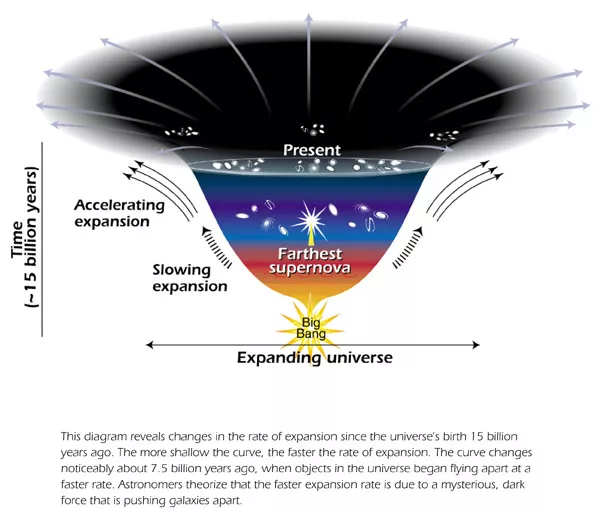What is the multiverse? In the latest movie "Dr. strange 2: Crazy multiverse", based on Marvel comics, superheroes shuttle back and forth between many parallel universes, each similar but different. According to Brian green, a theoretical physicist at Columbia University, presenting the multiverse on the screen is not a bad thing - even if there are some horror movie plots.

Schematic diagram of accelerated expansion of the universe caused by dark energy
"I think it would be great if these ideas could be presented in different ways." Brian Green said. Dr. strange 2: Crazy multiverse depicts the multiverse as a mixture of amusement parks and haunted houses. In one scene, the magician and his disciples cross a series of dazzling universes like falling into a kaleidoscope. However, Green said the idea of traveling from one parallel universe to another was a major mistake made by the film.
"It's not something that happens naturally in mathematics," he said. "Perhaps it should be said that the multiverse has all kinds of 'flavors'. In most cases, it doesn't mean that I can travel by rocket or spacecraft to visit another universe in the multiverse."
So why do physicists think other universes might exist? Green said that additional dimensions and parallel universes provide an explanation for some theories; It can be said that without the multiverse, these theories would be meaningless. For example, if the equation describing space-time is expressed in 10 or 11 dimensions instead of three-dimensional space and one-dimensional time, the effect is the best.
Dark energy is some kind of energy that acts on the space-time structure itself. It overflows in the universe and seems to lead to the accelerated expansion of the universe. The dark energy hypothesis also raises some difficult questions. For example, is dark energy a cosmological constant? If it is a cosmological constant, how to explain the obvious difference between the theoretical value and the measured value (120 orders of magnitude)?
"Indeed, in many of our theories, each universe that makes up the multiverse has some dark energy, but its amount will vary from universe to universe." Brian Green said, "so if there are enough universes, then in this huge collection, there will be a universe with the dark energy we observe."

Columbia University physicist Brian green
It is not hard to imagine that some universes in the multiverse may be roughly similar to our universe. In this case, there may be different versions of Brian green in those universes. "If the specific set of particles that make up me - including the particles that make up my brain, memory and thought - exists in the multiverse, and the set also thinks he is me, then he is really me," Green said.
So, can future discoveries in physics lay a more solid foundation for the theory of the multiverse? One possibility is that the study of cosmic microwave background radiation (the so-called "afterglow of the big bang") will point to the abnormal phenomenon of collision between the two universes. On the other hand, the Large Hadron Collider (LHC) is preparing to collide protons at record energy levels, which is a "better experimental example" and may prove that additional dimensions do exist.
"One idea is to use protons to slam protons and observe the resulting fragments. Mathematical calculations show that some fragments may float out of our dimension and be squeezed into other dimensions. If this happens, we can observe because the fragments will take some energy away," Brian Green said
However, scientists have not made breakthrough discoveries so far, and they still need to explore under higher energy in the future. "We don't know what kind of data we'll find," Green said.
Green's current theoretical work focuses on the statistical distribution of different types of possible universes. He is also trying to adapt his new book until the end of time into a film. "For me, this book is a summary of my life's thinking on scientific problems. Of course, it also discusses the problems we have raised as human beings since we were able to raise them." Green said, "for example, why are we here? What is the essence of consciousness? What is religion? Where will the universe go when we look to the future from today? And can the answers to these questions tell us what is the most important thing?"